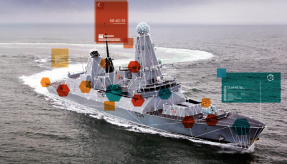
With dragonfly drones and invisible tanks, it’s no wonder that the latest innovation from BAE Systems is turning heads (and wheels!).
Inspired by the ironclad beetle, a new bendable titanium alloy suspension system is looking to help protect future military vehicles from explosive impacts. The ironclad beetle combines an extremely thick, hard shell with flexible legs for the ultimate in protection, allowing the insect to bounce back from impact.
Current combat vehicles may be protected from a blast, however, key operational parts can still be damaged such as the suspension, which leaves military vehicles stranded, missions aborted and in need of rescue. The new alloy features the material used in flexible glasses, allowing the suspension to bounce back into shape after impact.

Following initial tests by engineers at BAE Systems’ Telford facility, the prototype has proved successful and the system is anticipated to be in use within the next decade. A small-scale prototype was constructed and was tested under five increasingly powerful blasts, which showed significant resilience against the blasts as a result of its highly robust construction. The engineers are now investigating adapting memory metal suspension for full-size combat vehicles, creating full sized bendable titanium.
The prototype has been developed in response to the Dstl competition for an unmanned Highly Robust Ground Platform. Innovation is crucial to the advancement of defence technology and engineers are currently working to review a range of innovations and their possible applications in the defence spectrum.
Memory metal alloy was first developed by the United States Naval Ordnance Laboratory in the 1960s, but engineers at BAE Systems believe this is the first time it has been used to build an entire suspension system. Using memory metal also means the spring can be removed entirely from the suspension – strengthening and simplifying the system further.
Marcus Potter, Head of Mobility at BAE Systems Land (UK), said: “This unique use of memory metals could prove a real game-changer for combat vehicles taking part in operations. Being able to adapt to changing situations is hugely important to maintaining effectiveness, and this application of bendable titanium could give armed forces the required flexibility – and survivability – to complete tasks in challenging areas.”
If you would like to join our community and read more articles like this then please click here








